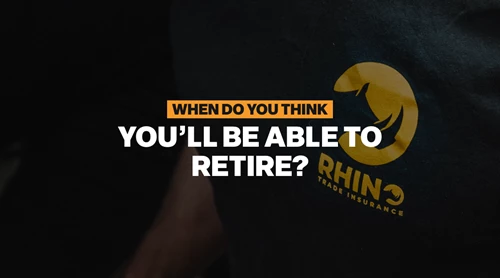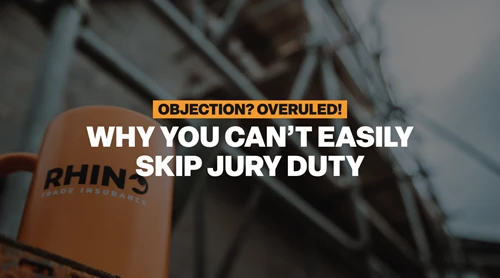For tradesmen and women, working on a building site can be both rewarding and challenging. While construction projects can lead to impressive results, they also present a variety of hazards that, if not managed properly, can lead to injuries, accidents, and even fatalities.
From heavy machinery and working at heights to electrical and fire hazards, we'll explore the key risks faced by tradespeople and offer practical advice on how to mitigate these dangers and create a safer working environment.
Falls from Heights
Falls from heights are one of the most common causes of injuries on construction sites. Whether you're a glazier, builder, bricklayer, or painter and decorator, working at heights is an inherent part of the job. Minimise risks using the following methods:
- The Right Training: Before working at height, ensure you have received proper training in the use of fall protection equipment, such as harnesses, guardrails, and safety nets. Additionally, regular refreshers are essential to stay up to date with industry safety standards.
- Save Your Bacon With Fall Arrest Systems: Always use fall arrest systems when working at heights. This includes securing yourself to anchor points with appropriate lanyards and harnesses.
- Guardrails and Toe Boards: Ensure that guardrails and toe boards are in place on scaffolding, roofs, and elevated work platforms to prevent accidental falls.
- Safe Access and Exits: Maintain clear, safe access and exit routes to and from elevated work areas to reduce the risk of tripping and falling.
Electrical Hazards
Working with electricity on building sites poses significant risks, and it's crucial to prevent electrical accidents and fires. Here's what you need to know:
- Leave It To The Pros: Only qualified electricians should handle electrical installations. If you're not a time-served electrician, avoid interfering with electrical systems unless you fancy a few shocks!
- Inspections and Testing: Ensure that all your electrical equipment and installations are regularly inspected and tested to identify and address potential issues before they become hazards.
- Ground Fault Circuit Interrupters (GFCIs): Any electrician worth their salt will be using GFCIs to prevent electrical shocks. These devices detect and interrupt electrical faults, protecting workers from electric shock.
- Lockout/Tagout Procedures: Need we say it? Implement lockout/tagout procedures to isolate and de-energise electrical systems during maintenance or repair work. This helps prevent accidental start-ups of any systems.
- Stay Clear of Overhead Power Lines: Always be aware of your surroundings. If there are overhead power lines, be sure to maintain a safe distance from them to prevent electrocution.
Heavy Machinery and Equipment
Construction sites can be filled with heavy machinery, such as diggers, excavators, trucks and forklifts, all of which can be hazardous if not used properly or avoided. Here's how to safeguard against these dangers:
- Equipment Training: Ensure that all operators are properly trained and hold the relevant licence to use any heavy machinery and equipment. In other words, don't let the apprentice jump on the excavator to dig the foundations of an extension and hit the water mains!
- Regular Maintenance: Just like taking a shower every day after work, your tools deserve the same care. Maintain a regular schedule for all machinery and equipment to keep them in good working condition. This will ensure they are safe and compliant and last longer.
- Talk to Each Other: Effective communication between tradespeople, the project manager and any labourers or apprentices is a must to prevent accidents. Consider using hand signals or radios to coordinate jobs and movement; don't just rely on the old shouting with your hand at the side of your mouth.
- Personal Protective Equipment (PPE): As a trade business, safety is key, so asking all workers to wear the appropriate PPE should be non-negotiable. Consider high-visibility clothing, hard hats, and steel-toed boots to minimise injury and the risk of a claim.
Hazardous Substances
Building sites often contain various hazardous substances, including chemicals, dust, and asbestos. To protect yourself and your fellow workers, consider the following:
- Material Safety Data Sheets: Whenever you are managing a project, always keep a record of any hazardous substances that might be on-site at any given moment. This should include information on safe handling, storage, and disposal.
- Ventilation: When around these substances, ensure that proper ventilation in enclosed spaces is in place to prevent the buildup of harmful fumes or dust. Without this, you or your employees may suffer down the line, which could end up in a claim.
- Respiratory Protection: As a trade business owner, wearing or providing appropriate respiratory protection, such as dust masks or respirators, for tasks that generate airborne particles or harmful gases is essential.
Fire Hazards
Fire hazards are a significant concern on building sites due to the presence of flammable materials and equipment. Implementing these safety measures won't eradicate risk but will help your trade business along the way:
- Fire Extinguishers: Ensure that fire extinguishers are readily available on your van or on the site. Tradespeople should always know their locations and how to use them in case a fire breaks out.
- Fire Safety Plan: Develop a comprehensive fire safety plan, including escape routes and assembly points, and educate all employees about it.
- No Smoking Areas: Designate no-smoking areas and enforce a strict no-smoking policy whilst on-site, especially near flammable materials or fuel storage.
Trips, Slips, and Falls
Trips, slips, and falls are very common causes of injury on trade sites. Here's how to reduce this risk:
- Good Housekeeping: Maintain a clean and organised work environment, with tools and materials properly stored and debris cleared regularly.
- Adequate Lighting: Light that site up! Ensure that work areas are well-lit to minimise the risk of tripping over objects.
- Slip-Resistant Flooring: Depending on your work and the site, use slip-resistant flooring materials in areas prone to wet conditions or spills.
- Proper Footwear: Be professional and get yourself the appropriate footwear for site work. These should include slip-resistant soles to reduce the risk of slipping.
Why You Need Protection From Rhino Trade Insurance
As a tradesperson, your safety and the safety of your colleagues should always be a top priority on any building site. There is often a lot going on when working in the trades; a site may have more than one profession at any given time, and there can be materials dotted here, there and everywhere. That's why it's vital to safeguard your own livelihood and just take that extra bit of care and detail to avoid any potential accidents.
One step you can take if disaster strikes is by purchasing a quality trade insurance policy. This should include various forms of cover such as Public Liability Insurance, Employers Liability Insurance and Personal Accident cover. Have you ever considered what would happen if an accident occurred on-site and you had to pay out compensation, or worse, you couldn’t work? Find out everything you need to know about Rhino Trade Insurance's cover now and get a quote in an instant. Call us on 0116 243 7904 or go to our website for more info.




